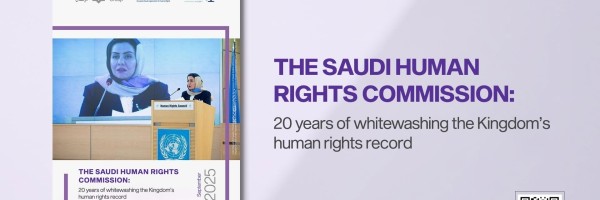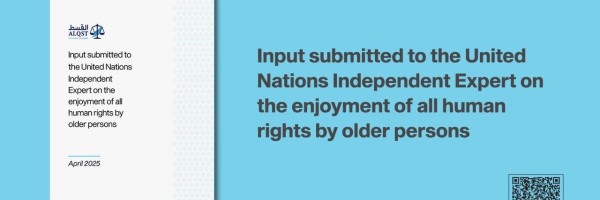Annual report issued by ALQST in the first quarter of each year, monitoring and documenting the main events of the previous year for the benefit of researchers, journalists, other organisations and anyone interested in reading a summary of the main human rights-related events occurring in Saudi Arabia.
Executive summary
As the year 2019 began, the human rights situation in Saudi Arabia had reached an all-time low. Saudi Arabia was already a repressive, autocratic state that had never been a democratic or free country, but mounting repression and gross violations of rights are rapidly making things even worse. The past year, 2018, the year covered by this report, saw a multitude of rights violations and state-sponsored crimes, the most repugnant and blatant being the brutal torture of human rights activists, notably women; the barbaric and premeditated assassination of journalist Jamal Khashoggi; and the public prosecutor’s call for death sentences to be passed on peaceful activists including Israa al-Ghomgham, Salman al-Odah, Awadh al-Qarni and Ali Hamza al-Amri.
During the course of 2018 all segments of Saudi society have been targeted, and all those who spoke out freely have been put away behind bars. Some have received lengthy jail sentences, and torture has made a horrifying and brutal comeback, most notably in that detained women human rights activists have been tortured, sexually harassed and threatened with rape and killing. Dissidents outside the country have been targeted in various ways, the most notorious being the murder of the journalist Jamal Khashoggi. The authorities have sought to stifle free speech even further with a systematic assault on social media known as “the electronic armies” or “the electronic flies”, as well as cyber espionage and hacking.
War crimes continued to be committed in Yemen, and the effects of the economic crisis were intensified for the general public by the introduction of new fees and taxes and a reduction in salary bonuses and earnings. Prices rose, and poverty and unemployment rates went up. A lot of people were affected by services being suspended or disrupted, and many migrant workers were sent home, some of them to countries they had fled because of war. Steep fees were imposed on them, and new rules crept in that added to the violation of their rights.
The authorities continued to rule out ending the male guardianship system, which restricts women’s freedom and prevents them from going about their daily lives without endless permissions from a male guardian. Executions continued to be carried out in large numbers, in many cases on the basis of ta’zirisentences imposed at the discretion of a judge, and for non-violent acts. The authorities increased their efforts, through both official and non-official media and with campaigns online, to sow hatred among different segments of society, intensify racism and sectarianism, and sharpen divisions among different social groups as well as with neighbouring states and other countries of the world.
The deterioration in the human rights situation has been going on since King Salman came to the throne in 2015, and increasingly so as his son, Crown Prince Mohammed bin Salman, has gained ever-greater powers and influence. To deflect attention from this, the authorities have relied on PR and publicity campaigns, the silencing of criticism from any quarter at home or abroad, and the backing of other autocratic regimes like the governments of Bahrain and Egypt, as they embarked on rash ventures and foreign wars, and created artificial crises with countries that did not support their actions, as with Qatar, Canada, Norway, Sweden, Turkey and Germany. They have used the public finances to purchase allies through multiple corrupt operations, illegally using sovereign wealth investment, which the public is prevented from controlling or holding a stake in, to make their despotism look respectable, by financially propping up repressive governments or through arms deals – for weapons which have been used to commit further violations, thus perpetuating an increasing cycle of corruption, repression and tyranny.
Until now, many governments have backed the Saudi authorities’ rights violations, or simply stood by and watched them taking place; and many world leaders were initially swayed by Mohammed bin Salman’s self-promoting propaganda presenting the Crown Prince as a reformer. This changed somewhat when he – along with those who stood by him and his reformist claims – was hit by scandal following stories of horrendous torture of female detainees and the murder of Jamal Khashoggi in the Saudi Consulate in Turkey.
We at ALQST call on the international community to openly condemn the Saudi authorities’ continuing and escalating violations. Silence or complicity will only open the way for the authorities to commit further abuses. Pressure must be exerted on the Saudi authorities to take a number of specific measures in order to improve the human rights situation in the country, including end the harassment, prosecution and conviction of anyone for peacefully exercising their rights to freedom expression, association or assembly, end the use of torture and cruel, inhuman and degrading treatment, including against women’s rights activists, and abolish the male guardianship system (see Recommendations at the end of this report). Whether such measures are made will signal whether the authorities are genuinely interested in reform, or are determined to persist in disregarding the rights of citizens in Saudi Arabia and abroad.




